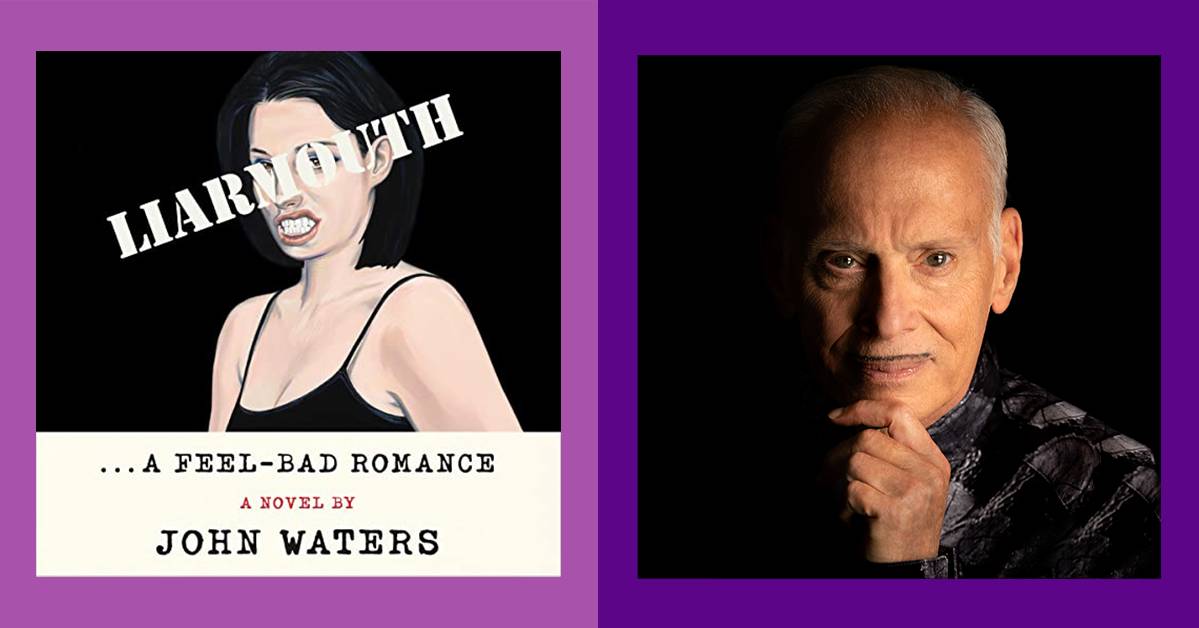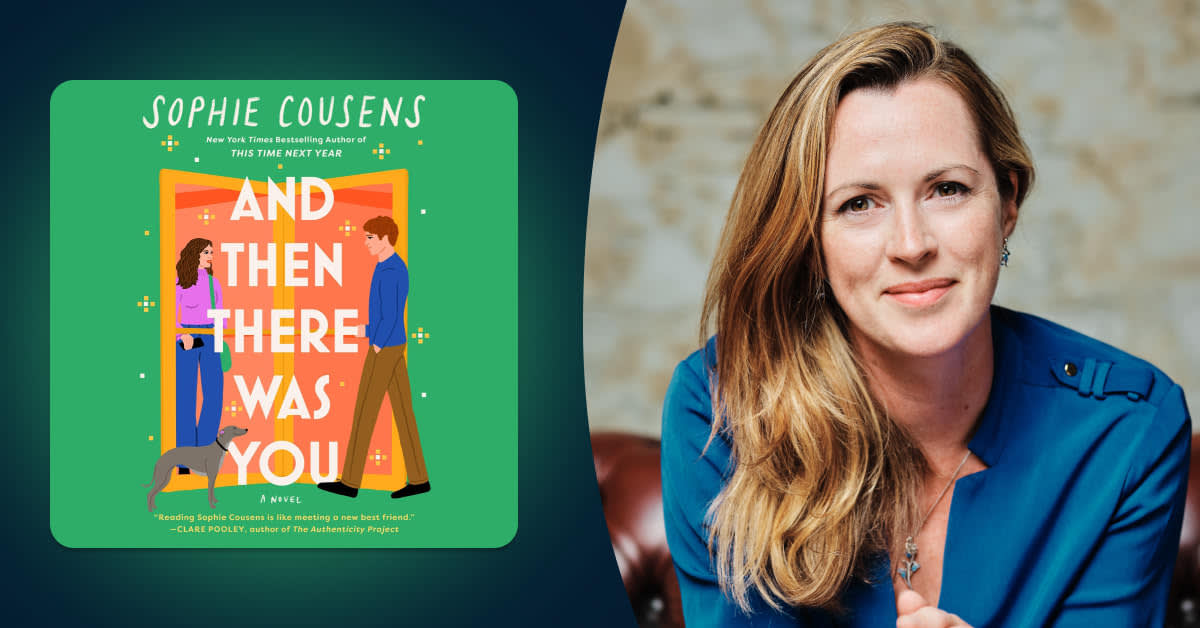Note: Text has been edited and does not match audio exactly.
Jerry Portwood: Hi, I'm Jerry, an editor with Audible, and I'm thrilled to chat with one of my favorite creative minds, John Waters. A self-described filth elder who's been called the Prince of Puke and the Pope of Trash, he's also considered a national treasure by many of us. The man behind Pink Flamingos, Hairspray, Cry-Baby, and one of my all-time favorite movies, Serial Mom, he's busier than ever with guest appearances on the final season of Search Party and the fourth season of The Marvelous Mrs. Maisel, gallery exhibitions of his work, and performing his one-man show in front of live audiences once again.
His three recent nonfiction books have been best sellers, and now John Waters celebrates the bizarre, the absurd, the grotesque, and the perverse, in his hysterical debut novel, Liarmouth, out May 3. It will definitely challenge some folks, which is the point. Thanks so much for joining us, John.
John Waters: Thanks for having me here, to talk about something new and novel.
JP: Well, that's where I want to start. First, congrats. I know you're turning 76 this spring, and that you have a lot of celebrations planned so far. But not everyone can say that they're ready to share their debut novel at this age, and I just wanted to know, what inspired you to go to fiction?
JW: Well, I've written 16 movies. That's fiction, you know? The first part of Carsick, where I imagine the best rides and the worst rides, were fiction. Except I was in that; that's very different. And a screenplay is very different than a novel. Just like the same way I challenged myself to hitchhike across the country myself when I was 66, take LSD again when I was 70, I had never written a novel, so I challenged myself to do that. And it took three years. It's not easy, there's no shortcut to writing a novel that I know of. I hadn't done it before, and I wanted a new way to tell a story. That's what I am, a storyteller.
JP: I've read your three recent nonfiction books. I read them in hardback, but this is the first time I've listened to you narrate a book. Tell me a little bit about that audio narrating.
JW: Whenever you read your book out loud, it sounds more hideous. I'm looking over at the poor technicians that are recording it, when I am deep in a scene that is so bizarre, and rude, and hideous, and sexual, that at the same way, my books are supposed to be funny. I don't think they're ever supposed to be erotic; I don't think they're always supposed to be funny. I'm trying to parody many things in this. Narrative itself, experimental writing, alliteration. There's no plot, but in every sentence, 10 things happen. So I'm certainly satirizing everything I can think of about a novel. But reading it out loud, it always sounds more extreme to me. And every time I have ever done the audiobook, I have found typos that got the last-minute “stop the presses” to fix them. It is the final time you copyedit, too, when you're reading the book out loud.
"I'm certainly satirizing everything I can think of about a novel. But reading it out loud, it always sounds more extreme to me."
JP: I love alliteration. You have so much clever wordplay, you pile on so many rhymes and alliterative moments. It's so outrageous sometimes. Did you have to take a breather? How did you pace yourself in all of that?
JW: I write every morning from 8:00 to about 11:00. That's how I pace myself. At the same time, I rewrote it many, many times. I had four women work for me, and three of them are really great copy editors, so we go through with them. I have a really good editor, and my agent goes over it with me. So many people go over it with me. There's a thin line of what you can get away with today, and we'll see if I've been able to cross that.
At the same time, the alliteration stuff, I do read it out loud to myself when I'm writing, certainly. And it is ridiculous sometimes. Sometimes I just throw out obscure dialogue from some of my movies that most people would never get, or the name of a weird movie, like, Hallelujah the Hills, which is an obscure [Adolfas] Mekas movie. But it doesn't matter, it doesn't stop the plot, and the 10 people that get it will really like it.
JP: But did you find that any of those were tongue-twisters when you were trying to narrate?
JW: Yeah. I can't think of an example, but words that you've read your whole life, you've just never said out loud, you don't know how to pronounce them even though you think you do. And you get to it, and then you realize, "I've written this word my whole life, but I've never said it." So that's an eye-opener too.
JP: So maybe you have gone too far. I mean, Liarmouth has everything. Loads of criminal high jinks, creepy dog plastic surgery, a cult of bouncing and shaking fanatics, and lots and lots and lots of genitals, even a talking penis. I was aware of tickle fetishists, but I was not really aware of ear masturbation, and I know in your acknowledgments you thank somebody for that. Can you tell us a little bit about the research?
JW: I was not aware of ear masturbation either. To this day, I don't know if the book I read on it was a parody or is true. Is there such a thing as ear masturbation? I don't know. I found this book that I have in my sex section of my library that a fan gave me called Ear Masturbation. So I gave him credit, that's where I did my research on it. As far as I know, that is the only book on ear masturbation. But I was trying to think of a new level of sex writing. I'm definitely trying to make fun of sex writing in it and everything.
"I was trying to think of a new level of sex writing. I'm definitely trying to make fun of sex writing in it and everything."
JP: Well, I do have one for you, then, because have you heard about people getting off on COVID nasal swab tests?
JW: No, but that doesn't surprise me. I say in my spoken word show, "Are there new COVID perversions? Are there antibody queens, are there bossy booster bottoms?" You know, there's all sorts of terms there. But what do they do with the COVID test?
JP: It's just called nussy stimulation.
JW: I guess are there COVID bug-chasers? I guess those would be the ones that would collect used positive tests and stick them up their nose. Is there such a thing as a true bottom bug-chaser?
JP: Totally. So the book is a road trip book, right? From Baltimore, you go to New York. The characters are on buses, they're on planes, trains, automobiles, and they end up in Provincetown.
JW: Oh yeah, I know the route well: every bus, every train, every car, every way to get to all those places. Although I did print out New Jersey Turnpike maps, so I remember which places you were stopping, and the last waterbed motel in America for the bouncers. And so I took out maps and everything; I did do real research on it.
JP: I did wonder, because you have done these trips so much, you have this great scene in LaGuardia. Do you think that LaGuardia's going to be better now that all of the big construction has happened?
JW: I've certainly been in all those airports, and every one of those things that I wrote about thieving in airports could happen. I'm amazed, in the old days, when you got your bag, there was somebody there who could check the tag. They don't have that anymore. I was with Pat Moran once and she picked up the wrong suitcase, and somebody said, "Hey, that's mine!" It looked like it was the same suitcase. It could happen, it's the perfect excuse.
I'm in airports constantly, sometimes on a plane every day. And so when I was writing it, I was constantly looking for things that could happen, or adventures that could happen in an airport.
JP: And if you were to steal John Waters's luggage, you'd get some great outfits. Some vintage Comme des Garçons, some other things. Let's talk about Marsha Sprinkle, because, as you describe, she's hated by everyone, including dogs. And you have this long line of amazing anti-heroines and bad women, from Beverly Sutphin, who I love, and Dawn Davenport, of course, and so many others. How does she kind of fit into your "Trashterverse," as some people call it?
JW: In the very, very beginning, maybe 20 years ago, Liarmouth was a movie idea. It's almost completely different, but she fits in well. Yes, she's a really hateful person, but the more hateful she is, the more I kind of liked her, and more I got into writing about her. And she does learn some things at the end, even though it does have a surprise ending. I wouldn't say that she learned her lesson, let's put it that way, which makes me like her even more. She's true to herself. She just thinks she's better than everyone else, and maybe she is.
JP: I was thinking about what you've said before about how you're curious about people. Is there a word that's the opposite of misanthrope?
JW: Yeah, I think an optimist. I do believe in the basic goodness of people. That's why I wanted to write a novel about someone where that is not true. She was not basically a good person. But I always say don't judge, because you don't know what happened to that person. And what happened to her, as hideous, sexually, and ridiculous as it was, it was traumatic, basically. And the thing with the dogs was traumatic, but certainly how her child was conceived was especially traumatic for her, and she never got over it until she meets the one insane person that makes her change through ear masturbation, which is something that no one ever thinks they would do. So she stole from somebody once, but he stole from her first. So that was the mutual attraction, and suddenly it threw her power into reverse, and as every hooker in the world will tell you, powerful people like to give up their power.
JP: You mentioned there's surprises, and we don't want to spoil any of those. But you do have this pivotal scene in Provincetown at the end, and you were in P-Town last year when people were ready to have their hot vax summer, and I wondered if that somehow inspired this crazy, chaotic finale that you created in the book.
JW: They have every kind of celebration. It's grown and grown. They have Bear Week, of course, but then they have Gay Pilots Week, they have Men of Color Week, they have all these weeks. So I think, "What's next, what could be?" They might have Tickler Week, that could be next. And the end of this book is probably the rudest sexual minority there could be. Maybe after the book it will make this festival happen for real, and that would be pretty fun.
Will the Chamber of Commerce get behind that one? There's the test. And will the new town crier ever speak to me again? There's even a picture of me dressed as the town crier in my art show, and then there was one of me as the dogcatcher, too. So I have been dressed as both the characters in the pivotal scene in Liarmouth, at the end in Provincetown. I've written many of my books and many of my movies, partially, at least, in Provincetown. I write there every day, Monday to Friday.
JP: I knew about the town crier, and I've seen the pictures of you as the town crier, but I didn't know the dogcatcher was a Provincetown character.
JW: Well, the dogcatcher isn't. It's actually a woman, and they're not called dogcatchers anymore, they're called Animal Control. But the dogcatcher is generally the most hated person in town, right? And Provincetown is the most dog-friendly town in the world, to a fault, if you ask me.
JP: So are you worried that maybe Provincetown is going to think this has gone too far?
JW: Provincetown always goes too far. That's its appeal. That has been its reputation from the day the pilgrims arrived, decided it was too weird, and went somewhere else. They landed there and thought, "Uh-oh, this is too remote, too weird." So I think I'll be fine.
"Provincetown always goes too far. That's its appeal."
JP: I think you're going to be fine, but I know that you have experienced lots of pushback and criticism over the years, and we do seem to be in this weird moment. Those of us who've been around long enough know that we've been through Satanic Panic, we've been through all these other panics, and now we're in this latest moral panic. And I just wondered, do you think, like I said to a friend of mine the other day, "Is comedy just dead?” I wondered what you thought about that.
JW: In the old days, the censors used to be blue-nose old Republican white people. Now if there's any censors, they're going to be rich liberal kids that are righteously politically correct. I think this book is politically correct in a weird way. We went through it many, many times and we became our own sensitivity editor. But the whole book makes fun of political correctness, and different ridiculous minority rights that could happen. I like the extremes of the rules of the all-outsider society that I live in. When I made Multiple Maniacs, I made a movie that made fun of hippie values, even though I lived in the hippie world, and hippies were who came to see that movie.
I guess that I'm always making fun. But I love the worlds that I'm making fun of. So that's the difference, I hope. We'll see. I don't know how this book is going to be received.
JP: I actually teach a class at the New School called "Writing About the Arts," and one of the sessions I teach is on camp. And I had them watch the 1997 Simpsons episode that you were in to understand camp. And the kids were horrified, and thought it was offensive.
JW: What was offensive to them about it?
JP: They didn't understand why Homer was being so mean to Bart and thought he shouldn't be gay. They didn't get it.
JW: They've never heard of a parent that was anti-gay? I mean, they had never heard of homophobia? Had they heard of racism?
JP: It was more like they didn't understand why camp existed or what it meant.
JW: They might have a point there. I'm not so sure camp does exist anymore, because camp originally meant something that was so bad it was good. The stuff that people would describe as camp today is trying to be so bad that it's good. True camp did not try, they were serious. That's why Showgirls is funny. No matter what he says today, he didn't mean for that to be funny. My movies were not real camp, because they were satires. A satire is almost never camp. It's when you do something dead seriously and it goes so terribly wrong that it's funny. That's what camp means.
JP: I have a selfish question, and it's partly because you've been so focused on so many other creative pursuits. I was thinking, since you've worked with so many wonderful actors over the years, if you would ever create an audio original where you would actually have all these great women and people you worked with create a story that existed in the audio landscape?
JW: Oh, that I hadn't thought of. I still am involved with some movie project that my contract says I'm not allowed to talk about in the press. And that's because I write books, so they know that anything they say I could write in the books. I've never thought of that one. It could be another folder of projects in development.
JP: They're now doing them as multi-narrator type things where it's almost like the old-school radio plays.
JW: I've never written a play, either. I never say never, we'll see. After the book comes out, we'll see what the next project is.
JP: And just so listeners know, you can get Liarmouth and John Waters' other audiobooks on Audible now. Thanks so much, John.





